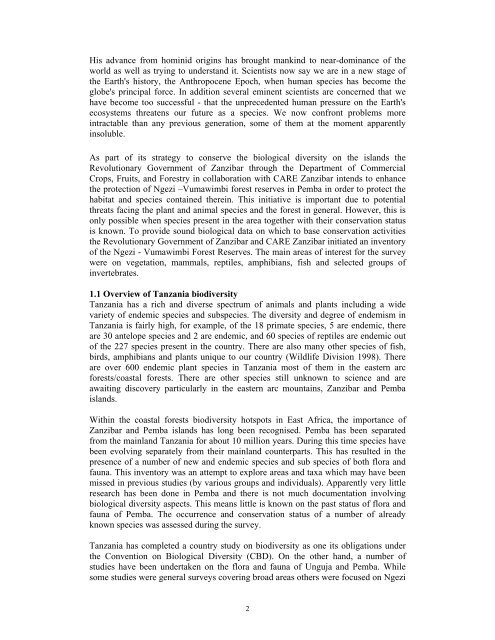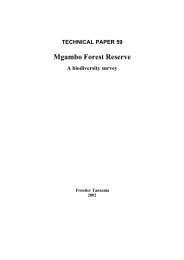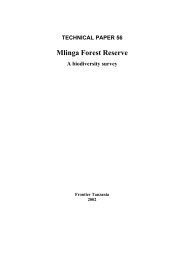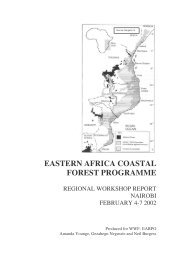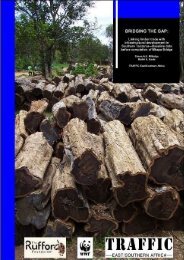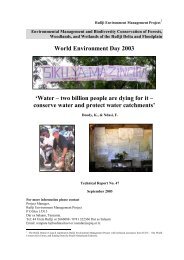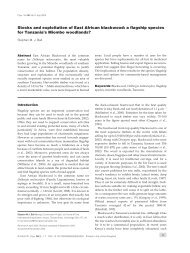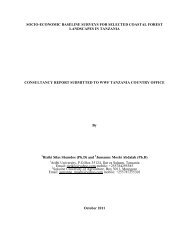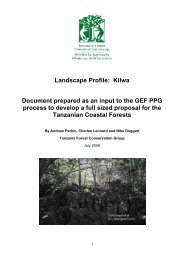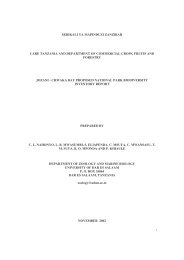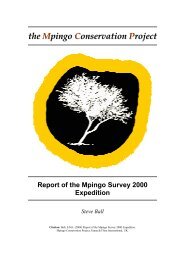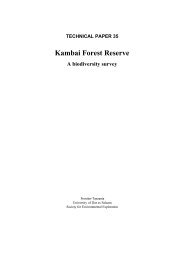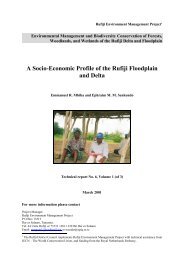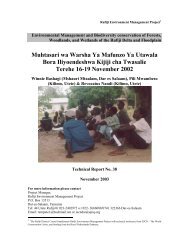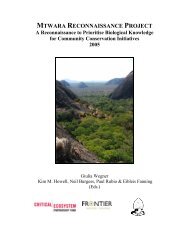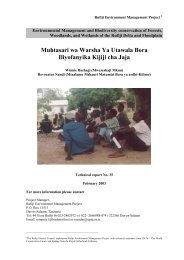serikali ya mapinduzi zanzibar care tanzania and department
serikali ya mapinduzi zanzibar care tanzania and department
serikali ya mapinduzi zanzibar care tanzania and department
Create successful ePaper yourself
Turn your PDF publications into a flip-book with our unique Google optimized e-Paper software.
His advance from hominid origins has brought mankind to near-dominance of the<br />
world as well as trying to underst<strong>and</strong> it. Scientists now say we are in a new stage of<br />
the Earth's history, the Anthropocene Epoch, when human species has become the<br />
globe's principal force. In addition several eminent scientists are concerned that we<br />
have become too successful - that the unprecedented human pressure on the Earth's<br />
ecosystems threatens our future as a species. We now confront problems more<br />
intractable than any previous generation, some of them at the moment apparently<br />
insoluble.<br />
As part of its strategy to conserve the biological diversity on the isl<strong>and</strong>s the<br />
Revolutionary Government of Zanzibar through the Department of Commercial<br />
Crops, Fruits, <strong>and</strong> Forestry in collaboration with CARE Zanzibar intends to enhance<br />
the protection of Ngezi –Vumawimbi forest reserves in Pemba in order to protect the<br />
habitat <strong>and</strong> species contained therein. This initiative is important due to potential<br />
threats facing the plant <strong>and</strong> animal species <strong>and</strong> the forest in general. However, this is<br />
only possible when species present in the area together with their conservation status<br />
is known. To provide sound biological data on which to base conservation activities<br />
the Revolutionary Government of Zanzibar <strong>and</strong> CARE Zanzibar initiated an inventory<br />
of the Ngezi - Vumawimbi Forest Reserves. The main areas of interest for the survey<br />
were on vegetation, mammals, reptiles, amphibians, fish <strong>and</strong> selected groups of<br />
invertebrates.<br />
1.1 Overview of Tanzania biodiversity<br />
Tanzania has a rich <strong>and</strong> diverse spectrum of animals <strong>and</strong> plants including a wide<br />
variety of endemic species <strong>and</strong> subspecies. The diversity <strong>and</strong> degree of endemism in<br />
Tanzania is fairly high, for example, of the 18 primate species, 5 are endemic, there<br />
are 30 antelope species <strong>and</strong> 2 are endemic, <strong>and</strong> 60 species of reptiles are endemic out<br />
of the 227 species present in the country. There are also many other species of fish,<br />
birds, amphibians <strong>and</strong> plants unique to our country (Wildlife Division 1998). There<br />
are over 600 endemic plant species in Tanzania most of them in the eastern arc<br />
forests/coastal forests. There are other species still unknown to science <strong>and</strong> are<br />
awaiting discovery particularly in the eastern arc mountains, Zanzibar <strong>and</strong> Pemba<br />
isl<strong>and</strong>s.<br />
Within the coastal forests biodiversity hotspots in East Africa, the importance of<br />
Zanzibar <strong>and</strong> Pemba isl<strong>and</strong>s has long been recognised. Pemba has been separated<br />
from the mainl<strong>and</strong> Tanzania for about 10 million years. During this time species have<br />
been evolving separately from their mainl<strong>and</strong> counterparts. This has resulted in the<br />
presence of a number of new <strong>and</strong> endemic species <strong>and</strong> sub species of both flora <strong>and</strong><br />
fauna. This inventory was an attempt to explore areas <strong>and</strong> taxa which may have been<br />
missed in previous studies (by various groups <strong>and</strong> individuals). Apparently very little<br />
research has been done in Pemba <strong>and</strong> there is not much documentation involving<br />
biological diversity aspects. This means little is known on the past status of flora <strong>and</strong><br />
fauna of Pemba. The occurrence <strong>and</strong> conservation status of a number of already<br />
known species was assessed during the survey.<br />
Tanzania has completed a country study on biodiversity as one its obligations under<br />
the Convention on Biological Diversity (CBD). On the other h<strong>and</strong>, a number of<br />
studies have been undertaken on the flora <strong>and</strong> fauna of Unguja <strong>and</strong> Pemba. While<br />
some studies were general surveys covering broad areas others were focused on Ngezi<br />
2


